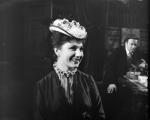
ANGEL WITH A TRUMPET
UK, 1950, 98 minutes, Black and white.
Eileen Herlie, Basil Sydney, Norman Wooland, Maria Schell, Andrew Cruickshank, John Justin, Oskar Werner, Anthony Bushell, Wilfrid Hyde- White.
Directed by Anthony Bushell.
Angel With A Trumpet is a little-known British film of 1950 but is worth seeing. It offers an overview of Austria from the late 19th century to the end of World War Two, a fifty-year period with such significant changes.
The film focuses on a family, a family which makes pianos with the theme and symbol of an angel: the filrm’s motto is: “The trumpet says, ‘Make music’, the angel says, ‘Serve God’”.
The film starts in the period of the late Austro-Hungarian? empire, the time of the suicides at Mayerling (dramatised in several films). It shows the style of Viennese life around 1900 and then the enormous transitions with the experience of World War One. The film goes on to show the transition of the 1920s, the jazz age coming to Europe – and then Nazism, its rise, the outbreak of World War Two.
The film stars a number of British character actors of the period. Eileen Herlie and Basil Sydney had acted together two years earlier in Olivier’s Hamlet as Claudius and Gertrude. The film offers an early opportunity to two Austrian actors who became international stars, Maria Schell and Oskar Werner (the latter’s voice is dubbed).
Anthony Bushell appears as Baron Hugo Traun. He directed the film and also The Long Dark Hall before moving into television direction. However, he appeared in a number of films during the 1950s, especially with a military tone, films like Bitter Victory, The Purple Plain, The Red Beret, The Battle of the River Plate, A Night to Remember.
1. The significance and symbolism of the title? The trumpet making music, the angel serving God, The indication of themes and their exploration?
2. How enjoyable was this panoramic view of history? The sense of humanity, the taste and style of the film?
3. The British ingredients of the film, the Austrian tones? Audience response to these and to their blending?
4. The film's impact in 1949? Now? Black and white photography, locations, the panorama of history, the background of music and Vienna?
5. How successful was the panoramic structure of the film? The continual focussing on the Angel for the passing of time, the continuity of the family? The function of the narrator and his comments?
6. The film's exploration of themes of history, time, change, people being the same and yet different? Enclosed in "a world and a world view”?
7. The insight into Austria and its history? The sense of Empire, the late nineteenth century, stagnation in politics and styles, morals? The contrast with the 20th century? The anniversary of the Ault firm indicating history and the continuity with the past, eg Mozart? The impact of war changing the patterns? The Charleston compared to the previous dances? The impact of Nazism from outside Austria? Persecution changing a way of life? The need for rebuilding after destruction? Was this an adequate insight into recent history of Austria?
8. The film's focus on Henrietta, how suitable? Audience sympathy for her and interest in her? Henrietta's focus for the dramatic picture of the film? The characters seen in relation to her? The times as having an effect on her?
9. Discuss the character of Henrietta: the explanation of her background as an actress, her relationship with Rudolf, influence tn him? Her love for Francis, the objections to the marriage, decision for the marriage? The impact of Rudolf's death, the interview with the Emperor? Marriage and her children? The reappearance and the crisis in decision? her returning to her family? The importance of the anniversary and time passing? Watching her children grow up? The impact of war, the children going to war, Francis and his paralysis? Her insight into the marriage after so many decades? Her response to her children, to Monica leaving, to Herman's blackmail, to Paul's happiness? Her watching Nazism grow? Her Jewish origins though Catholic faith? The nature of her death? The heritage she handed on? The portrait of Henrietta as a portrait of human life?
10. What kind of person was Francis? The bourgeois background, in work and morals, in formal style? His disregarding of his relatives advice? his suspicions of Henrietta? The formal nature of the marriage? His dependence on her? The relationship at the end? Henrietta's clutching Rudolf's note and Francis' note at her death?
11. The picture of Austria in 1888: the details of Empire, the nature of manners and morals, family discussions, snobbery, the races, evenings with Rudolf, interviews with the Emperor?
12. The world of 1900: illness, marriage, happiness?
13. The picture of 1914: symbolised by the anniversary: music, Ann and Paul?
14. The presentation of war: Herman and hie eagerness to go, Paul and his going, his imprisonment; Francis and his injury? The skill of the collage in presenting the nature of and progress of the war?
15. Herman and his lack of character, abusive of money, Nazism, his failing to save his mother? The comment on the kind of character who became a Nazi?
16. Monica and her leaving Austria for America, the kind of person who emigrated, her mother's realising that she needed a chance for love?
17. Paul and Anna and their happy marriage, after the war and the rebuilding of the firm?
18. The comment on Nazism and its persecutions?
20. The optimism of the ending and the rebuilding of the world?
20. How impressive a chronicle of current history?